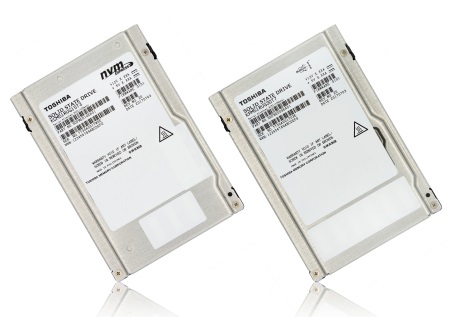
Toshiba Announces NVMe over Fabrics Software Technology, Enterprise-Class SSDs with 64-Layer 3D Flash Memory
Toshiba today unveiled software technology essential to enabling deployment of NVMe-oF (NVM Express over Fabrics). The company also unveiled the development of two new flagship enterprise solid state drive (SSD) solutions, the TMC PM5 12Gbit/s SAS series and the CM5 NVM Express (NVMe) series.
The NVMe-oF (NVM Express over Fabrics) software stack deploys on storage servers, and provides critical solid state drive (SSD) abstraction, security and manageability.
NVMe-oF is a storage architecture that runs NVMe commands over a fabric transport to enable NVMe based storage to be shared across network and scaled to thousands of devices with near DAS-like performance. Integrating with popular orchestration and provisioning frameworks, Toshiba's software abstracts the details of physical SSDs to enable them to rapidly assign virtual namespaces of any size and performance to any compute node making NVMe-oF truly deployable in cloud data centers.
"Toshiba sees NVMe-oF as an important near-term storage technology that very effectively utilizes flash across the data center by disaggregating storage and enabling dynamic, diverse applications to share high performance, high capacity NVMe SSDs," said Steve Fingerhut, senior vice president and general manager of Toshiba America Electronic Components, Inc. SSD business unit. "Our software technology makes NVMe-oF attached flash easily deployable in the cloud data center. We're proud to collaborate with Mellanox and Lenovo to demonstrate this groundbreaking technology at Flash Memory Summit."
Toshiba, Mellanox and Lenovo have teamed up to demonstrate Toshiba's NVMe-oF software.
New SAS and enterprise NVMe TLC-based solid state drives
Toshiba also today unveiled the development of the TMC PM5 12Gbit/s SAS series and the CM5 NVM Express (NVMe) series. Development is expected to be completed in the fourth quarter.
Both product lines are built with TMC's latest 64 layer, 3-bit-per-cell enterprise-class TLC (triple-level cell) BiCS FLASH.

Offering up to 30.72TB in a 2.5-inch form factor, the TMC PM5 series introduces a full range of endurance and capacity SAS SSDs. With the first MultiLink SAS architecture, the PM5 series is able to deliver among the fastest performance the market has seen from a SAS-based SSD with up to 3,350 MB/s of sequential read and 2,720 MB/s of sequential write in MultiLink mode and up to 400,000 random read IOPS in narrow or MultiLink mode. The PM5 series' 4-port MultiLink design is an additional technology to achieve high performance, close to PCI EXPRESS (PCIe)8 SSDs, enabling legacy infrastructures to increase productivity without having to be re-architected from the ground up. Furthermore, PM5 SSDs support multi-stream write technology, a feature that intelligently manages and groups data types to minimize write amplification and minimize garbage collection, translating into reduced latency, improved endurance, increased performance and Quality of Service (QoS).
As TMC's next generation NVMe SSD, the dual-port PCIe Gen3 x4 CM5 is a full-featured enterprise SSD. Like the PM5, it also supports multi-stream write technology. It is NVMe over Fabric-ready with scatter-gather list (SGL) and controller memory buffer (CMB) features. The CMB feature uses a part of DRAM on the SSD as host-system memory, reducing DRAM used load of host-side and it enables high speed as a system. Utilizing TMC's BiCS FLASH 64-layer technology, the CM5 series oggrtd up to 800,000 random read and 240,000 random write IOPS for the 5 DWPD (drive writes per day) model and up to 220,000 random write IOPS for the 3 DWPD model, both with a maximum power draw of 18W.
Additionally, the CM5 is being used as a platform to demonstrate and to enable the ecosystem around the Persistent Memory Region (PMR) capability. PMR enables Toshiba's customers to augment system memory with DRAM on the SSD without the use of expensive non-volatile DIMMs (NV-DIMMs). This feature makes it possible for a single SSD solution to provide both high performance storage and persistent memory to meet system performance requirements, while reducing costs by moving metadata operations, such as logging, journaling and application staging to the SSD.
PM5 12Gbit/s SAS SSDs will be available in capacities ranging from 400GB to 30.7TB with sanitize instant erase (SIE) and Trusted Computing Group (TCG). CM5 NVMe SSDs will offer capacities ranging from 800GB to 15.36TB with SIE and TCG. Both TLC-based product lines offer standard endurance ratings with 1, 3, and 5 DWPD options, and the PM5 has a 10 DWPD option available.
Toshiba is sampling the PM5 and CM5 series to OEM customers.





















